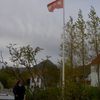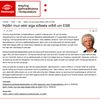5.8.2009 | 03:29
Daily Telegraph ritskošaši grein Joly!
Breska blašiš Daily Telegraph taldi žaš vera skyldu sķna aš gęta lżšręšisins ķ Bretlandi meš žvķ aš tķna śt śr grein Evu Joly žaš sem einhver (kannski Darling-Brown) telur vera žegnum Bretadrottningar óhollt aš vita um žeirra eigin stjórnvöld, Evrópusambandiš og Alžjóšagjaldeyrissjóšinn.
Hér aš nešan er enska śtgįfa greinar Joly eins og hśn sjįlf gekk frį henni. Raušlitušu efnisgreinarnar eru žęr sem uršu fyrir baršinu į Daily Telegraph. Žeim var hent śt śr grein Joly. Óvķša mildar blašiš oršalag Joly. Blįi textinn er žaš sem Daily Telegraph birti og lét sem žaš vęri grein Joly. Blašiš segir lesendum sķnum ekki sannleikann um aš žetta er ritskošašur śtdrįttur blašsins śr grein Evu Joly!
Daily Telegraph byrjaši į aš ritskoša fyrirsögn greinarinnar: Henti śt fyrirsögn Joly og bjó žessa til: "Gordon Brown is wrong, Britain played a part in Icelandic bank collapse". Žaš er synd aš segja aš Brown eigi ekki hauk ķ horni žar sem Daily Telegraph er!
Žetta var fyrirsögn Joly og hśn fór fyrir brjóstiš į ritstjórn Daily Telegraph:
Iceland – lessons to be learned from economic meltdown
In the wake of the failure of the Icelandic banks Messrs Brown, Barroso and Strauss-Kahn prove that they have understood nothing
From G8 to G20, many heads of state and government seem to delight in repeating that nothing will ever be the same again. The world is changing, to the point of being turned on its head by the crisis; the way we think and act in terms of financial regulation, international relations and development aid must therefore, according to them, change too. However, numerous examples contradict all this big talk. The situation in which Iceland now finds itself following the implosion of its banking system and the emergency nationalisation of its three main banks (Kaupthing, Landsbanki and Glitnir) is undoubtedly one of the most significant of these examples. This small country of 320,000 inhabitants is now reeling under the weight of billions of Euros of debt, which has absolutely nothing to do with the vast majority of its population and which Iceland cannot afford to pay.
Ķ góšri žżšingu Frišriks Rafnssonar sem žżddi alla grein Joly į ķslensku hljómar efnisgreinin svona: "MÖRGUM žjóšhöfšingjum og rķkisstjórnum, allt frį G8 til G20, veršur gjarna tķšrętt um aš héšan ķ frį verši ekkert eins og žaš var įšur. Heimurinn hafi breyst, kreppan hafi jafnvel gerbreytt honum; afstaša okkar og vinnubrögš varšandi lagaumhverfi fjįrmįlastarfsemi, alžjóšasamskipti eša žróunarsamvinnu verši žvķ, aš žeirra sögn, einnig aš žróast. En žvķ mišur ganga fjölmörg dęmi žvert gegn žessum fagurgala žeirra. Staša Ķslands nś ķ kjölfar bankahrunsins og žjóšnżtingar žriggja stęrstu bankanna žar (Kaupžings, Landsbankans og Glitnis) er sennilega eitt skżrasta dęmiš um žetta. Ķsland, žar sem eru einungis 320 žśsund ķbśar, sér nś fram į aš žurfa aš axla margra milljarša evra skuldabyrši sem langstęrstur hluti žjóšarinnar ber nįkvęmlega enga įbyrgš į og ręšur alls ekki viš aš greiša."
Daily Telegraph gerši śtdrįtt śr efnisgreininni hér aš ofan: "Iceland, a small nation with just 320,000 inhabitants, is reeling under the weight of billions of euros of debt, which has absolutely nothing to do with the vast majority of its population and which it cannot afford to pay." Eins og menn sjį žį tekur Daily Telegraph orš Joly śr samhengi meš žvķ aš sleppa ašfararoršum hennar um af hverju žessi byrši er lögš į Ķslendinga.
Daily Telegraph henti śt nęstu efnisgrein: I became interested in Iceland through my role as an adviser to the criminal investigation into the causes of the failure of its banks, which is at the root of its difficulties. However, I am not going to talk about that investigation, but something that goes far beyond it. In any case, I am by no means a spokesperson for the Icelandic authorities, whose responsibility in all this is clearly not insignificant. The previous government had even been dissolved due to public dissent over cronyism and the clannish running of institutions, which were seen as the cause of all of its problems. Moved by the fate of Iceland’s deserving and likeable people, and the complete absence of discussion in the European media about what the future holds for them, I simply want to draw the attention of public opinion to the issues at stake in this case – major challenges that are not confined to the shores of this island. The irresponsible attitude of certain countries, the EU and the IMF to the collapse of the Icelandic economy demonstrates their inability to learn from the dramatic undermining of the model that it embodied: one of excessive deregulation of markets, particularly financial markets, that the majority of those same key players contributed to shaping.
Ķ ķslenskri žżšingu Frišriks Rafnssonar hljómar žessi efnisgrein sem aš mati Daily Telegraph er óholl Bretum žannig: "Ég fékk įhuga į Ķslandi žegar ég var fengin til aš starfa sem rįšgjafi vegna réttarrannsóknar į orsökum bankahrunsins, sem er rót žess vanda sem landiš glķmir nś viš. Umfjöllunarefni mitt nś varšar hins vegar ekki žį rannsókn; žaš er mun vķštękara en hśn. Auk žess er ég ekki į neinn hįtt talskona ķslenskra stjórnvalda, en žau bera vitaskuld umtalsverša įbyrgš į žessu öllu saman. Sś stjórn sem sat žegar bankahruniš varš neyddist raunar til aš segja af sér, enda hafši almenningur risiš upp og mótmęlt žeim hagsmunaįrekstrum og klķkuskap ķ stjórnkerfinu sem eru undirrót allra ófara žeirra. Žar sem ég er snortin af örlögum žessarar grandvöru og elskulegu žjóšar og finnst sįrlega skorta umręšu um hlutskipti hennar ķ evrópskum fjölmišlum, langar mig bara aš vekja athygli almennings į žvķ hversu miklir hagsmunir eru ķ hśfi ķ žessu mįli – grķšarlegir hagsmunir sem afmarkast sķšur en svo af strandlengju Ķslands. Įbyrgšarlaus afstaša sumra rķkja, Evrópusambandsins og Alžjóšagjaldeyrissjóšsins gagnvart hruni ķslenska efnahagskerfisins sżnir aš žau eru ófęr um aš draga lęrdóm af hruni žess samfélags sem Ķsland var holdgervingur fyrir – ž.e. samfélags óhefts markašsfrelsis, einkum frjįlsra fjįrmįlamarkaša, sem žessir sömu ašilar tóku žįtt ķ aš móta."
Žrišju efnisgreinina skrar Daily Telegraph annars vegar nišur og umoršaši hins vegar. Blįi liturinn er žaš sem komst ķ gegnum nįlarauga ritstjórnar Daily Telegraph. Raušlitaša textanum henti ritstjórnin śt: Let us look, first of all, at the demands of the UK and the Netherlands. These countries are concerned by the failure of the Icelandic banks because they had welcomed their subsidiaries and branches with open arms, even though their authorities had been at least partially alerted to the risks hanging over those banks. They are now demanding that Iceland pay them astronomical sums (more than €2.7 billion to the UK and over €1.3 billion to the Netherlands), plus interest at 5.5%. They consider that Iceland was responsible for guaranteeing the funds deposited with Icesave, the internet arm of Landsbanki that was offering unbeatable rates. The British and the Dutch decided to set that guarantee not at around €20,000 per deposit, as provided for in European and Icelandic legislation– which would already have been impossible for the Icelandic government, who quickly announced after nationalising its banks that it could only guarantee deposits made in Iceland itself – but at €50,000 to €100,000 per deposit, or even higher. Moreover, the measures that they are taking to get their way are scandalous. Indeed, at the very start of October, the UK began with a measure of extreme retaliation: freezing of the assets of not only Landsbanki but also Kaupthing Bank, which was totally unconnected to Icesave, using its anti-terrorism legislation. In doing so, the UK lumped the Icelandic people, their allies in NATO, together with the likes of organisations such as al-Qaeda... And since then, it seems to be using all of its influence to ensure that no international aid is really given to Iceland until its demands have been met. Indeed, Gordon Brown told his parliament that he is working “with the IMF” to establish how much it considered the UK was entitled to claim from Iceland. The IMF itself, meanwhile, not content with putting off making its loans available to Iceland, attached conditions to them that would seem outrageous, even in fiction. One example of this is the objective of bringing Iceland’s public deficit down to zero by 2013, a target that is impossible to achieve but that will nevertheless lead to huge cuts in the most essential areas of spending such as education, public health, social security, etc. Finally, on the whole, the attitude of the EU and other European countries has hardly been more commendable. The European Commission has clearly sided with the UK, as its President announced in November that there would be no European aid until the Icesave case had been resolved. It is true that Mr Barroso – too busy with his own campaign and terrified of upsetting his main source of support, London – is, as is often the case, in over his head. Even the Scandinavian countries, which heralded international solidarity, are conspicuous by their lack of reaction to the blackmailing of Iceland – which certainly puts the generosity of the loans they have promised into perspective.
Ķ žżšingu Frišriks Rafnssonar: "Žaš voru Hollendingar og Bretar sem įkvįšu einhliša aš upphęš innistęšutryggingarinnar ętti aš vera ekki ašeins 20 žśsund evrur fyrir hvern reikning, rétt eins og kvešiš var į um ķ evrópskum og ķslenskum lögum– nokkuš sem žegar var ógerlegt fyrir ķslensku rķkisstjórnina aš standa viš, en hśn hafši tilkynnt mjög fljótlega eftir aš bankarnir voru žjóšnżttir aš ašeins vęri hęgt aš įbyrgjast innlįn į Ķslandi –, heldur aš upphęš 50.000 til 100.000 evrur, jafnvel hęrri. Raunar var gripiš til hneykslanlegra žvingunarrįšstafana vegna žessa. Bretland greip žannig strax ķ októberbyrjun til afar róttękra ašgerša: frysti innistęšur į reikningum Landsbankans og einnig Kaupžings, sem žó hafši nįkvęmlega ekkert meš Icesave aš gera, og beitti til žess lögum um barįttu gegn hryšjuverkum. Meš žessu setti Bretland Ķslendinga, bandamenn sķna ķ NATO, ķ sama flokk og hryšjuverkasamtök į borš viš al-Qaeda... Upp frį žessu viršist Bretland hafa lagst meš öllum sķnum žunga gegn žvķ aš alžjóšasamfélagiš grķpi til nokkurra rįšstafana sem komiš geta Ķslandi aš gagni fyrr en žaš hefur haft sitt fram. Gordon Brown gaf žannig ķ skyn ķ breska žinginu aš hann „ynni meš Alžjóšagjaldeyrissjóšnum“ til aš nį fram kröfum sķnum gagnvart Ķslandi. Alžjóšagjaldeyrissjóšurinn žurfti žvķ aš fresta žvķ aš lįna Ķslandi og setti afar hörš skilyrši fyrir veitingu lįnsins. Žaš į viš um žau markmiš aš nį jafnvęgi ķ fjįrlögum į Ķslandi ķ sķšasta lagi įriš 2013, markmiš sem ekki er gerlegt aš nį, en kemur engu aš sķšur til meš aš leiša til grķšarlegs nišurskuršar ķ grundvallarmįlaflokkum į borš viš menntakerfiš, heilbrigšiskerfiš, almannatryggingakerfiš, o.s.frv. Afstaša Evrópusambandsins og annarra Evrópurķkja var lķtiš skįrri. Framkvęmdastjórn Evrópusambandsins tók strax ķ nóvember skżra afstöšu meš Bretlandi žegar forseti hennar lét aš žvķ liggja aš ašstoš myndi ekki berast frį Evrópu mešan Icesavemįliš vęri enn ófrįgengiš; raunar mį segja aš Barroso, sem žį var allur meš hugann viš eigin kosningabarįttu og daušhręddur viš aš styggja helstu stušningsmenn sķna, Breta, hafi žį eins og fyrri daginn algerlega veriš bśinn aš missa stjórn į atburšarįsinni. Sama mį segja um Noršurlöndin, sem žó eru ötulir talsmenn alžjóšasamstöšu, en afreka žaš nś helst aš bregšast ekkert viš žeirri kśgun sem Ķsland er beitt – nokkuš sem dregur śr trś manna į raunverulegan vilja žeirra til žess aš veita Ķslandi stušning."Nęstu efnisgreinar komust ķ gegnum nįlarauga Daily Telegraph, en ritstjórnin gat ekki stillt sig fullkomlega um ritskošun og felldi śt hluta śr setningum Joly. Eins og įšur žį er textinn sem ritstjórnin tók śt raušlitašur:
Mr Brown is wrong when he says that he and his government have no responsibility in the matter. Firstly, Mr Brown has a moral responsibility, having been one of the main proponents of this model which we can now see has gone up the spout. But he also has a responsibility in the sense that he cannot really hide behind the legal status of Icesave – which made it formally dependent on the Icelandic banking authorities – and say that the UK had neither the means nor the legitimacy to supervise its activities. Could anyone realistically think that a handful of people in Reykjavik could effectively control the activities of a bank in the heart of the City? Moreover, it should be noted that the European directives concerning financial conglomerates seem to suggest that EU member states that allow such establishments into their territories from third countries must ensure that they are subject to the same level of control by the authorities of the country of origin as that provided for by European legislation. So, was there perhaps a failure on the part of the British authorities on this point, which would not be particularly surprising considering the ‘performance’ of other English banks (which were in no way related to Iceland) during the financial crisis? If so, Mr Brown’s activism in relation to this small country (įhersla Joly į hve fį viš erum var of mikiš fyrir nżlenduherrana og žeir settu Iceland ķ stašinn) might be motivated by a wish to appear powerful in the eyes of his electorate and taxpayers, whose own losses cannot be played down. Of course, the Icelandic institutions have a great deal of responsibility in this matter. But does that necessarily mean that the – also considerable – responsibility of the British authorities should be overlooked, dumping it all on the Icelandic people alone?
Iceland, whose only remaining source of income is its exports, will certainly not be able to pay off those debts. The Icesave agreement, that the Icelandic parliament is expected to vote on soon, would burden Iceland with a debt equivalent to £700 billion for the UK or $5.6 trillion for the US. Nor will Iceland be able to clear its deficit in less than five years, when national deficits are rising more quickly than ever, even for the great powers – with the UK and the US once again providing two very good examples. Unless a radical new approach is adopted, Europe and the IMF are about to perform a major feat: reducing a country whose HDI had, in just a few decades, reached the highest level in the world, to the rank of a poor country... The consequence of this is that the Icelandic people, the majority of whom are highly qualified and multilingual and have strong work relationships with the Nordic countries where they can assimilate easily, are already starting to emigrate. In the end, neither the IMF, nor England or the Netherlands will be able to be reimbursed. Just a few tens of thousands of retired fishermen will be left in Iceland, along with its natural resources and a key geostrategic position at the mercy of the highest bidder – Russia, for example, might well find it attractive.
Even so, there are alternative solutions. Indeed, the countries of the European Union could have devised a mechanism that would allow them to consider their own responsibilities in this situation, to improve the regulation of financial markets and even take on at least part of the debt – which European legislation in no way prohibits – for having failed in their banking supervision role.
They could have offered to help Iceland, which obviously has no experience in the matter, with the investigation that it is seeking to conduct to try to understand what really happened and to thoroughly analyse the causes of this disaster. They could even have taken the opportunity to start their own debate about a European public prosecution service in charge of matters concerning transnational crime, particularly financial crime, which, once again, European legislation in no way precludes. The IMF and its Managing Director could also have taken this opportunity to thoroughly review the nature of the conditions that they attach to their loans. They could have made them more realistic, more focused on the long term, and made it possible to incorporate at least some social considerations. That would have been a first step towards true reform of multilateral institutions of this type and international solidarity procedures – and for Mr Strauss-Kahn himself, a chance to finally make his mark at the head of the IMF (žetta umoršaši ritstjórn Daily Telegraph): and would have finally given IMF managing director Dominique Strauss-Kahn a chance to make his mark.
Engaging in this debate would obviously require a lot of time and energy, and a great deal of vigilance, particularly in the European Parliament, where discussions should be organised over the coming months. However, the Swedish presidency of the EU does not seem to be in a hurry to improve regulation of the financial sectors, and the committees with an economic focus in the Parliament are, more than ever, dominated by liberals, particularly British liberals. Yet the tools and levers for real progress are there; a catastrophe like that in Iceland could finally raise a meaningful international response, instead of the irresponsible and cynical pressures that we can still see today.
Žannig ritskošaši og matreiddi ritstjórn vķšlesins dagblašs ķ nżlenduveldinu Bretlandi grein Evu Joly ofan ķ breskan almenning. Og ķslensku rķkisstjórninni finnst ekki įstęša til aš tala mįli ķslensks almennings ķ śtlöndum.
Helga Garšarsdóttir
Flokkur: Stjórnmįl og samfélag | Breytt s.d. kl. 03:33 | Facebook
Tenglar
Įhugaveršar innlendar vefsķšur
- Áskorun til forseta Íslands
- Economic Disaster Area
- "Glæsileg niðurstaða"!
- Heimssýn
- Hagsmunasamtök heimilanna
- Hvítbókin
- Icesave-reiknir - hver skuldbindingin?
- Samningurinn við Breta vegna Icesave
- Samningurinn við Hollendinga vegna Icesave
Įhugaveršar erlendar vefsķšur
- Bloomberg
- Business Monitor International
- Do you know the truth about the EU?
- Folkebevægelsen mod EU, Danmörku
- Global Britain... in the wider world
- Institute for Creditary Economics - ICE
- Naomi Klein
- Nei til EU, Noregi
- Nej til EU, Svíþjóð
- Juni bevægelsen for et nyt og slankt EU
- RGE Monitor
- TEAM the European Alliance of EU-Critical Movements
- VOX
- World Socialist Web Site
Erlend dagblöš og tķmarit
- Aftenposten
- Al Jazeera
- Berlinske Tidende
- Dagens Nyheter
- Deutsche Welle - DW-World
- Dimmalætting
- E24
- Economist
- Financial Times
- Forbes
- Fortune
- Gulf Times
- IceNews - Daily News
- Irish Independent
- Jyllands-Posten
- Le Figaro
- Le Monde
- London Evening Standard
- Politiken
- Spectator
- Telegraph
- The Daily Princetonian
- The Huffington Post
- The Independent
- The New York Times
- The Wall Street Journal - Europe Edition
- The Washington Post
- Zeit On Line
Greinar um Ķsland og kreppuna ķ erlendum mišlum
- Walking up to reality in Iceland, by Jón Daníelsson
- Time to install Iceland 2.0, by Ben H Murray
- Bizarre battering of insurers, by Anthony Hilton
- European bank bail-out could push EU into crisis, by Bruno Waterfield
- In praise of Iceland, editorial
- Culpability debate at RBS intensifies, by Kate Burgess
- Iceland in turmoil as coalition collapses, by David Ibison
- Iceland Turns Hard Left
- Ireland? Iceland? Doubts on Doomsday Scenario in Eire, by Landon Thomas
- Crime Once Exposed Has no Refuge but in Audacity - Tacitus, by Íris Erlingsdóttir
- Iceland's Conservatives Try to Rewrite History, by Íris Erlingsdóttir
- Cracks in the crust
- Major-Washington Agency Runs Iceland Look-Alike Casting, by Edward Hugh
- Nobel prize winner blasts IMF over loans
- How Bad Could The Crisis Get? Lessons From Iceland, Jón Daníelsson
- Iceland: The country that became a hedge fund, by Peter Gumbel
- Ultra-Capitalism Killed Iceland
- Upheaval calls for Fleece Revolution in Iceland, by Lenka Vaiglova
- Who bombed Iceland? by Uwe Reinhardt
- World Agenda: is this the most hated man in Iceland? by Roger Boyes
- Britain and the Netherlands bully little Iceland, by Ársæll Valfells
- Iceland gets cold feet over paying back bailout
- Latvian debt crisis shakes Eastern Europe, by Ambrose Evans-Pritchard
- Iceland PM hits out at IMF rumors, by K. Már Hauksson
- Britain's 'gunboat' diplomacy still angers Iceland, by Ambrose Evans-Pritchard
- A Debate Rages in Iceland: Independence vs. I.M.F. Cash, by Landon Thomas
- All Of Them Must GO, by Naomi Klein
- SFO to help Iceland as probe turns to Kaupthing's US links, by Rowena Mason
- Iceland hits impasse over lost savings, by Andrew Ward and Alex Barker
- Icelanders are angry but will make sacrifices, by Jóhanna Sigurðardóttir
- Iceland seeks UK fraud office help, by Andrew Ward
- For you, the war is over, by Andrew Hill
- Iceland poised for foreign payback pact, by Andrew Ward, Megan Murphy and Jim Pickard
- Iceland’s debt repayment limits will spread, by Michael Hudson
- Iceland: what ugly secrets are waiting to be exposed in the meltdown?, by Rowena Mason
- The ice storm, by Gauti Kristmannsson
- Brain drain hits cash-strapped Iceland, by Susanne Henn
- Islands nye krise, av Ola Storeng
- Iceland's bank crisis delivers baby boom, by Andrew Ward
- Is Iceland too small? By Þorvaldur Gylfason
- Iceland shows the dangers ahead for us all, by Robert Wade
- Islands Schulden sind zu teilen, Von Clemens Bomsdorf
- The IMF destroys Iceland and Latvia, by Nathan Lewis
- The Lehman Brothers collapse: the global fallout, by Richard Wachman
- Iceland urges media to lift nation’s gloom, by Andrew Jack
- Iceland after a year of financial crisis, by Robert Jackson
- Iceland’s PM: Icesave Will Decide the Coalition’s Fate
- Iceland’s PM: We Cannot Wait for IMF Any Longer
- Iceland Reaches Agreement with IMF
- Iceland Minister Confident Icesave Bill Will Pass
- Iceland's president turns cold on Icesave deal, by Rowena Mason
Greinar um Ķsland og kreppuna ķ innlendum mišlum
Įlit erlendra sérfręšinga um orsakir efnahagshrunsins
- Undersized: Could Greenland be the new Iceland? Should it be?
- The Icelandic banking crisis and what to do about it: The lender of last resort theory of optimal currency areas
Greinar um hvers vegna Icesave eru ekki skuldir Ķslendinga
Greinar um efnahagskreppuna ķ erlendum dagblöšum
Evrópusambandiš
- Support for Lisbon Treaty falls eight points to 46%, by Stephen Collins
- The European Union the New Soviet Union, by Vladimir Bukovsky
Śtvarps- og sjónvarpsžęttir į netinu
Innlendir og erlendir ljósvakamišlar
Bloggvinir
-
 malacai
malacai
-
 andrigeir
andrigeir
-
 arikuld
arikuld
-
 axelthor
axelthor
-
 baldvinj
baldvinj
-
 creel
creel
-
 birgitta
birgitta
-
 bjarnihardar
bjarnihardar
-
 gattin
gattin
-
 gagnrynandi
gagnrynandi
-
 draumur
draumur
-
 egill
egill
-
 erla
erla
-
 estheranna
estheranna
-
 finni
finni
-
 gretarmar
gretarmar
-
 tilveran-i-esb
tilveran-i-esb
-
 skulablogg
skulablogg
-
 bofs
bofs
-
 hreinn23
hreinn23
-
 morgunblogg
morgunblogg
-
 maeglika
maeglika
-
 helgatho
helgatho
-
 hedinnb
hedinnb
-
 kreppan
kreppan
-
 islandsfengur
islandsfengur
-
 jonl
jonl
-
 kaffistofuumraedan
kaffistofuumraedan
-
 capitalist
capitalist
-
 katrinsnaeholm
katrinsnaeholm
-
 liljaskaft
liljaskaft
-
 lydurarnason
lydurarnason
-
 vistarband
vistarband
-
 marinogn
marinogn
-
 pallvil
pallvil
-
 raksig
raksig
-
 raudurvettvangur
raudurvettvangur
-
 rutlaskutla
rutlaskutla
-
 sigurjonth
sigurjonth
-
 siggi-hrellir
siggi-hrellir
-
 sij
sij
-
 siggith
siggith
-
 fia
fia
-
 lehamzdr
lehamzdr
-
 isspiss
isspiss
-
 tryggvigunnarhansen
tryggvigunnarhansen
-
 vest1
vest1
-
 kreppukallinn
kreppukallinn
-
 reykur
reykur
-
 thjodarsalin
thjodarsalin
-
 aevark
aevark
-
 isleifur
isleifur
-
 thorsaari
thorsaari
-
 tbs
tbs
-
 eeelle
eeelle
Heimsóknir
Flettingar
- Ķ dag (15.9.): 0
- Sl. sólarhring:
- Sl. viku: 2
- Frį upphafi: 0
Annaš
- Innlit ķ dag: 0
- Innlit sl. viku: 2
- Gestir ķ dag: 0
- IP-tölur ķ dag: 0
Uppfęrt į 3 mķn. fresti.
Skżringar











Athugasemdir
Hreint og beint ömurlegt hjį žessum mišli aš gera svona, en ég held aš flest sé komiš fram ķ athugasemdakerfinu hjį žeim, skyldi hśn vita af žessari ritskošun ? og takk fyrir žessi skrif.
Sęvar Einarsson, 5.8.2009 kl. 05:53
Žaš er engu lķkara en viš séum ķ strķši!
Kvešja aš noršan.
Arinbjörn Kśld, 5.8.2009 kl. 11:28
Viš eigum ķ strķši! Viš eigum ķ millirķkjadeilu sem nęr langt śt yfir Evrópu. Viš vitum ekki nįkvęmlega hverjir eru andstęšingar okkar žvķ margir žeirra eru andlitslausir og nafnlausir, en viš vitum aš žeir hafa mikiš fé milli handa og viš vitum lķka aš žeir hafa völd.
Viš vitum lķka aš rķkisstjórnin okkar talar ekki okkar mįli eins og henni ber aš gera.
Hvet ykkur Sęvarinn og Arinbjörn til aš verša viš kalli InDefence, sem og alla ašra.
Kv. Helga
Vaktin, 5.8.2009 kl. 13:41
Viš žurfum aš fara aš dusta rykiš af vķraklippunum og siga Gęslunni į Breta, Cod War IIII er viš sjóndeildarhringinn, reyndar žarf aš skipta um ķ brśnni fyrst, žar eru ekkert nema druslur og gungur sem stżra žjóšarskśtunni, svo ég noti nś orš SJS og žaš er rétt, ég skal berjast til sķšasta blóšdropa žvķ ekki skal ein króna af minni innkomu fara ķ aš greiša žennan žręlasamning.
Sęvar Einarsson, 6.8.2009 kl. 11:05
Bęta viš athugasemd [Innskrįning]
Ekki er lengur hęgt aš skrifa athugasemdir viš fęrsluna, žar sem tķmamörk į athugasemdir eru lišin.